- Home
- Graham McNeill
Priests of Mars Page 23
Priests of Mars Read online
Page 23
‘With Magos Tychon’s added inload capacity, I have calculated an optimal exit point, which will leave us fifteen days beyond the system’s edge.’
‘Fifteen days? That is unacceptable, Magos Azuramagelli,’ said Kotov. ‘Find another exit point closer to Valette.’
‘Impossible,’ said Azuramagelli. ‘With the current drain on our energy reserves, there is no way to maintain the Geller field long enough to reach any closer with a safe enough margin of reserve.’
‘Damn the reserve,’ said Kotov, hot anger rising from his body in a haze of red floodstream. ‘Find us a closer exit.’
‘Magos Azuramagelli is, unfortunately, correct,’ said Saiixek of engineering, pulling a host of data tables and graphs from the air. ‘The loss of the plasma combustion chamber slows us by a factor too great to ignore.’
‘And without capacitor reserve, our operational protocols dictate that we cannot run under such conditions,’ added Kryptaestrex. ‘We need to return to real space and unfold the port collector to charge up the remaining capacitor. We’ll likely need to drain half the support ships of fuel and power or we won’t even reach the Halo Scar, let alone get beyond it.’
‘Indeed,’ said Blaylock. ‘Prudence might dictate that we abandon such an attempt until we are better able to face such a challenge.’
‘I wondered when you would suggest that,’ said Kotov.
‘Archmagos?’
‘Turning back? You’d like nothing better than for us to return to Mars in failure.’
‘I assure you, archmagos, I wish us to succeed as much as you.’
Kotov read no falsehood in Blaylock’s floodstream, but couldn’t quite bring himself to believe his Fabricatus Locum. The moment stretched, and Kotov realised he was out of options.
‘Very well,’ he said. ‘Make the necessary preparations for a return to real space.’
Abrehem, Coyne, Hawke and Crusha made their way through the cavernous transit chambers back towards the lower dormitory decks. The metal floor was slick with moisture and wisps of cold steam drifted from vents that billowed cold air into the arched tunnels.
‘This feels weird,’ said Coyne. ‘I always felt these tunnels were claustrophobic.’
‘When there’s hundreds of bondsmen trudging to and from work, it’s going to feel cramped,’ said Abrehem, trying not to remember the screams of the dying men in the reclamation chamber as the plasma wave engulfed them.
‘It’s cold too,’ said Hawke.
‘Yeah, and the air tastes funny,’ added Coyne.
‘It tastes... clean...’ said Abrehem, surprised he’d not noticed that. It had been so long since he’d tasted air that hadn’t been scrubbed through labouring filters or wasn’t laced with dust and toxins that he’d forgotten what clean air tasted like.
‘Maybe they’ve had a system purge after what happened?’ suggested Coyne.
‘Not likely,’ said Hawke.
‘Then what do you think happened?’
‘Like I care,’ said Hawke. ‘If the air’s cleaner then that’s great, but I don’t give a shiprat’s fart why it’s happened.’
Abrehem shook his head. ‘No, the air’s not just clean, it’s cold. I mean, really cold. Like it’s been frozen. And it’s hard, like it’s, I don’t know, stale or something.’
The others had no answer for him, and they walked the rest of the way in silence, along echoing tunnels lit through stained-glass lancets by dancing flames, down skull-stamped stairs of iron, through yawning portals fringed with carved stone cogs and past heaving ranks of relentless pistons.
They saw no one to offer an explanation for the emptiness.
Here and there, Abrehem saw discarded pieces of maintenance machinery fixed to the deck, but without anyone around to operate them. The more pressure hatches they passed through the more frequent the signs of something amiss became.
None of them had paid much attention to their surroundings since becoming bondsmen, and the omnipresent exhaustion had quickly drained them of any curiosity to look around. But without the press of bodies around them and the sudden clarity that comes from a near death experience, all three men felt a mounting apprehension as they approached their dormitory deck.
‘I don’t like this,’ said Hawke.
‘Where is everyone?’ said Coyne, echoing Abrehem’s thoughts exactly.
At last they reached the cavernous opening to the feeding hall, and as the airtight gate ground down into the deck, a wall of piled-up bodies tumbled into the passageway, like water over a collapsing dam. Freezing air gusted over the dead, and Abrehem backed away from the spilling corpses; men and women in the grimy coveralls of Mechanicus bondsmen. The bodies were pale, lips cyanotic, eyes wide with the pain and terror of sudden decompression and asphyxiation. Fingernails were bloody where desperate hands had clawed at the gate.
‘Thor’s blood,’ said Hawke, as the sliding heap of bodies came to a halt. ‘What the hell happened here?’
‘They’re all dead...’ said Coyne.
Abrehem felt the cold of the air clamp around his soul as he finally understood the cause of the freezing chill in the surrounding tunnels. He looked up the cliff-face walls at the gently rotating fan blades of the air-circulation vents. Strips of inscribed parchment fluttered from the louvres, prayers of purity and imprecations for untrammelled transit of air. Those prayers had been hideously mocked, and he tried not to imagine the horror of the men and women as the vents had reversed and drawn air instead of providing it.
‘The bastards!’ he cried, wrapping his arms around his scrawny frame. First the deaths in the reclamation chamber, and now this! How much could one man be expected to bear?
‘How did this happen?’ said Coyne, not yet reaching the inevitable conclusion offered by the blue-lipped corpses.
Crusha opened a path through the dead, lifting each body aside and showing surprising gentleness for one so monstrously bulked and so seemingly simple. Abrehem followed the ogryn and Hawke into the feeding hall, letting his eyes roam the empty ranks of tables, the monstrous silence and the scattered ruin of plastek trays. Servitors lay dead next to their serving machines, and while most of the bodies were piled high at the chamber’s three gates, many others were lying slumped below the air-circulation vents, perhaps in the vain hope that they might start up again.
Hawke followed Abrehem’s gaze and said, ‘They vented it. They bloody vented it all.’
Coyne turned towards Abrehem, willing him to deny what Hawke was saying. ‘No, that can’t be right? They wouldn’t do that.’
Abrehen felt the last shred of his humanity unravelling from his soul and being replaced by a tightening coil of absolute rage. ‘Hawke’s right. They vented the atmosphere from this deck into the vacuum, that’s why the air tastes cold and hard. It’s only just been restored.’
‘Why would they do that? It doesn’t make sense.’
‘The breach in the plasma combustion chamber,’ sighed Abrehem, sitting at one of the many vacant tables. ‘Whatever caused it must have been worse than than we knew. Saiixek probably decided to blow the air out of this deck to vent the plasma into space and suffocate the fire.’
‘But he’s killed an entire shift of bondsmen,’ said Coyne, still unwilling to accept that such a monstrous act could have been deliberate.
Abrehem surged to his feet and snatched Coyne by his oil-stained overalls.
He slammed Coyne into the wall and shouted in his face: ‘When are you going to get it into your thick head, that the Mechanicus don’t care about our lives? We’re numbers, nothing more than that. So what if Saiixek had to kill a few thousand bondsmen just to put out a fire? There’s always another world where he can collar more slaves to work themselves to death for his bloody Machine-God.’
‘Easy there, Abe,’ said Hawke, placing a hand on his shoulder. ‘Coyne here ain’t the enemy. It’s those Mechanicus bastards that need taking down a peg or two, yeah?’
Abrehem felt his fury abate and he released Co
yne with a shamefaced sob.
‘I’m sorry,’ he said.
‘It’s okay,’ said Coyne. ‘Forget about it.’
‘No,’ said Abrehem. ‘That’s the one thing I’m not going to do. The Adeptus Mechanicus murdered these bondsmen, and I’ll tell you this now. Someone’s going to pay.’
The Speranza limped out of warp space ninety-three minutes later, its hull intact and its Geller fields at the limit of their capacity to endure. Magos Kryptaestrex had squeezed every last reserve of non-essential power to keep the shields intact long enough to reach the designated exit point calculated by Magos Azuramagelli. At Kotov’s insistence – and much to Azuramagelli’s chagrin – his trans-immaterial calculations were verified by Linya and Vitali Tychon, but both Quatrian magi confirmed his equations were without error.
Far beyond the system edge of Valette, the Speranza broke the barrier between the empyrean and real space. The currents that had brought them this far through the warp were still turbulent, and the translation was not smooth. The Ark Mechanicus shuddered with translation burn, trailing ruptured screeds of immaterial energies that clung to its hull and howled madness at the crew within before vanishing in a haze of nebulous anger.
With perimeter security established, the enormous ship’s port flank opened up; blast shields and airtight shutters ratcheting open as the surviving solar collector emerged like a slowly unfurling sail. Complex lattices of joints, gimbals, rotator cuffs and multiple hinges expanded in a precise geometric ballet until a kilometre-wide and seven-hundred-metre-long bank of energy-hungry cells was aimed towards the shimmering light of the far distant Valettian sun.
So far from the system’s heart, the energy the collector would gather from the star would be low, but the stream of hot neutrons flowing along the length of the electromagnetically charged hull and gathered by the Speranza’s ramscoops was the main target of this harvest. Almost as soon as the collector was fully deployed, the charge levels on the drained capacitor began to climb, and the speed of that ascent would only increase as the Speranza picked up speed.
The emergency translation had scattered the fleet like seeds sown randomly by an agri-spreader, and another three hours passed before contact could be established with any other ship. One by one, the vessels of the fleet signalled their position, and began the slow process of regrouping. Refinery ships and genatorium vessels clustered close to the Speranza, monstrous umbilicals linking them to the Ark Mechanicus to suckle its mighty hunger for fuel and power. A dozen ships were emptied before the Speranza was sated enough to proceed.
Moonchild and Wrathchild, twin souls as well as twin ships, were the luckiest of the fleet, scattered a day’s travel ahead of the Speranza. The Adytum remained tucked in close to the mighty vessel, and the Cardinal Boras lay abeam of the fleet, less than fifteen hours away. The escorts Mortis Voss and Blade of Voss were not so lucky, trailing at least a day behind in wilderness space.
Despite repeated attempts to locate Honour Blade with long-range auspex, deep augur scans and astropathic scrying, no trace could be found of the third vessel launched from Voss Prime. The fleet searched for as long as Archmagos Kotov deemed appropriate, but every captain knew in his heart that to linger in the trackless gulfs between systems was too hazardous to risk for long.
The mater-captains of the surviving Vossian craft demanded extra time to search for their lost sister ship, but Kotov overruled them and threatened to relieve both women of command if they disobeyed his orders to make best speed for the distant system edge. Reluctantly, Mortis Voss and Blade of Voss turned their prows for Valette and followed orders.
The great bell in the High Temple to the Omnissiah of each remaining vessel was rung three times; once for the lost Honour Blade, once for the Machine-God’s lost children, and once for the mortal souls aboard her.
The fleet moved on, scattered and stretched beyond what any Navy doctrinal treatise on convoy tactics would consider prudent, but at least together and closing formation. With Moonchild and Wrathchild leading the way, the Kotov Fleet plotted an intercept course with the lonely outpost that that traced a two hundred and thirty-five year orbit of the star at the heart of the system.
The Valette Mechanicus Manifold station.
The last point of contact with the lost fleet of Magos Telok.
MACROCONTENT COMMENCEMENT:
+++MACROCONTENT 003+++
The Soulless sentience is the enemy of all life.
Microcontent 14
The atmosphere of the pack-meet was as frosty as the misty air gusting from the coolant units, and it wasn’t about to get any better, thought Moderati Koskinen. Skálmöld had been spoiling for a fight ever since the incident. Koskinen respected Skálmöld, but he didn’t really like him, though he couldn’t blame him for his anger.
In the two weeks since Lupa Capitalina attacked Canis Ulfrica, the prow forges of the Ark Mechanicus had worked continuous shifts to craft fresh weaponry and armour plates to replace the Reaver’s destroyed components. A veritable army of tech-priests, Legio acolytes and construction engines laboured on the fallen Titan, returning it to operational readiness. Such a monumental task would normally take months of intensive labour, ritual and consecration, but the Ark Fabricatus, a vast construction-engine magos named Turentek, had worked miracles in drastically shortening that time. The engine and its rebuilt parts would soon rise from the construction cradles, reborn and restored, but Koskinen knew it wasn’t the physical damage that was the worst thing to come out of the attack.
He stood beside Princeps Luth’s casket, pressing a palm to the panes of armourglas and feeling the slumbering heartbeat of the divine being within. Magos Hyrdrith attended the monitoring device attached to the base of Luth’s casket, and the winking status lights along its base attested to the renewed health of the princeps.
Luth was yet to be roused from his neurological dormancy, and who knew what state of mind the princeps would be in when he was awoken? Did he remember what happened on the training deck or would he still be fighting the desperate battle at Sulphur Canyon? Not even the senior Legio Biologis could say for sure what effect his actions would have on his mind. Koskinen willed Luth to be sane, for there was only one warrior who would take command of the Legio if the Alpha Princeps was judged unfit for duty.
Skálmöld’s casket sat opposite Luth’s, plugged in a recessed bay of the medicae templum given over to the Legio by Archmagos Kotov. The Reaver princeps was a shadowed figure that hung like a limbless revenant in milky-white suspension. His casket was slightly smaller and more ornate than Luth’s, owing to its design being commissioned under the rubric of a different Fabricator.
Magos Ohtar attended to his princeps with great diligence, for Skálmöld had suffered greatly too. His Titan had been damn near killed, and the feedback pain must have been unbearable. Like Lupa Capitalina, Canis Ulfrica had also lost a moderati. Tobias Osara had been vaporised in the blast that had taken the Reaver’s arm, and its second moderati, Joakim Baldur, had been badly wounded. His right arm and a portion of his skull were encased in dermal-wrap and his burned skin replaced with vat-cultured grafts. Baldur glared at Koskinen as though he was personally responsible for the bad blood between their Titans. Koskinen didn’t rise to the bait, and held his tongue while they awaited the arrival of the Skinwalker.
Cold air filled the medicae templum, and Koskinen pulled his uniform jacket tighter about himself, wishing he’d thought to wear his heavier robes. The temperature within was precisely controlled, and a thin patina of frost coated the metallic icons of the Omnissiah on the walls, the insulated machinery of the central cogitator and the porcelain-tiled floor. Sterile steel plating encased the lower half of the walls, and a complex network of ribbed pipework hung from the ceiling, venting occasional gusts of ammoniac steam. Hundreds of glassek cylinders, each large enough to contain a human being, lined the upper reaches of the roof space, suspended on mechanised arms that could rotate them to the floor. Koskinen remembered floating
in one of these fluid-filled tanks after the battle with the tyranids on Beta Fortanis, purging his floodstream of discarded data and Manifold junk.
It was not a pleasant memory, for such purges were not painless procedures.
Pacing the length of the medicae templum was Elias Härkin, whose pathogenically-ravaged frame was completely encased in a latticework exoskeleton of brass and silver. His shaven skull was red and black with a complete covering of woad-markings; jagged wolf-tails, bloodied fangs and slitted eyes in the darkness. Atrophied facial muscles twitched as the electrode stimulators that compensated for his cerebrovascular impairment and allowed him to speak fired a series of test signals. Like most princeps, Härkin loathed being removed from Vilka, and his artificially-motivated body moved with a stilted, hunched-over gait, not unlike the Warhound he piloted.
As a princeps he was a god, as a mortal he was cripple.
The pressurised door slid open, and the Skinwalker entered. The youngest princeps of Legio Sirius, Gunnar Vintras wore his silver hair shaven tight to the skull and his dress uniform was crisp and pressed as though about to attend a Legio function. A curved power sabre on a platinum chain hung at his hip, and he carried a gold-chased bolt pistol in a thigh holster.
‘Nice of you to show up,’ said Härkin, his dysarthria rendered intelligible by the fibre-bundle muscles, though still distorted.
‘Nice to see you too, Elias,’ said Vintras, taking a seat at the central cogitator bank. ‘When the Moonsorrow calls a pack-meet, I come running.’
‘The meet began thirty minutes ago,’ said Härkin.
Vintras shrugged and sprang from his seat as though already bored with sitting down.
‘It takes time to dress this well,’ he said, straightening his uniform jacket and brushing an invisible speck of dust from his shoulder epaulettes. ‘Of course, you have your cyber-grooms dress you, don’t you? They do the best with what they have, I’m sure.’
‘Princeps Luth isn’t dead, you know?’ said Koskinen, angered by Vintras’s posturing.

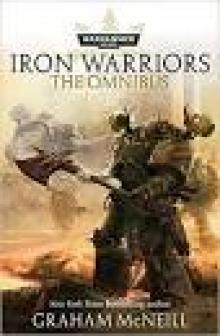 Iron Warriors - The Omnibus
Iron Warriors - The Omnibus Old Wounds, New Scars
Old Wounds, New Scars The Colonel's Monograph
The Colonel's Monograph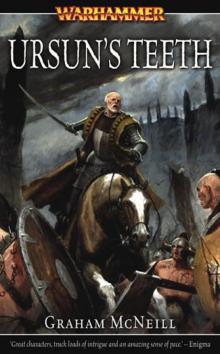 Ursuns Teeth
Ursuns Teeth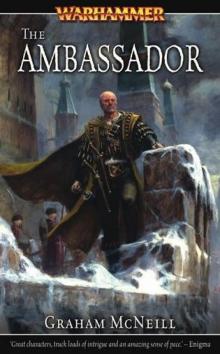 The Ambassador
The Ambassador![[Ultramarines 5] Courage and Honour - Graham McNeill Read online](http://i1.bookreadfree.com/i/03/12/[ultramarines_5]_courage_and_honour_-_graham_mcneill_preview.jpg) [Ultramarines 5] Courage and Honour - Graham McNeill
[Ultramarines 5] Courage and Honour - Graham McNeill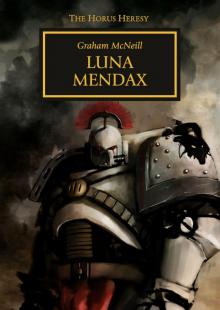 28a Luna Mendax
28a Luna Mendax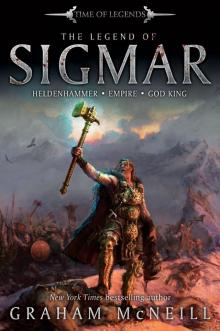 The Legend of Sigmar
The Legend of Sigmar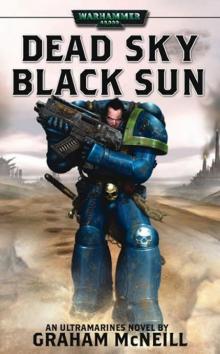 Warhammer - Ultramarines 03 - Dead Sky, Black Sun (McNeill, Graham)
Warhammer - Ultramarines 03 - Dead Sky, Black Sun (McNeill, Graham)![Warhammer - [The Ambassador Chronicles 01] - The Ambassador Read online](http://i1.bookreadfree.com/i/03/17/warhammer_-_[the_ambassador_chronicles_01]_-_the_ambassador_preview.jpg) Warhammer - [The Ambassador Chronicles 01] - The Ambassador
Warhammer - [The Ambassador Chronicles 01] - The Ambassador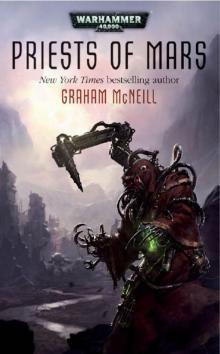 Priests of Mars
Priests of Mars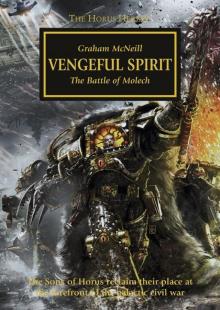 Vengeful Spirit
Vengeful Spirit![[Sigmar 03] - God King Read online](http://i1.bookreadfree.com/i/03/13/[sigmar_03]_-_god_king_preview.jpg) [Sigmar 03] - God King
[Sigmar 03] - God King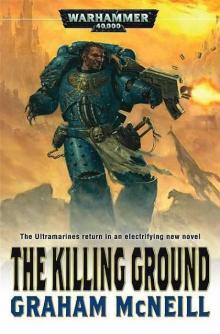 The Killing Ground
The Killing Ground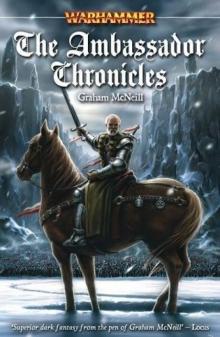 The Ambassador Chronicles
The Ambassador Chronicles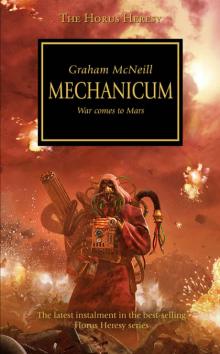 Mechanicum
Mechanicum![[Ulthuan 02] - Sons of Ellyrion Read online](http://i1.bookreadfree.com/i/03/14/[ulthuan_02]_-_sons_of_ellyrion_preview.jpg) [Ulthuan 02] - Sons of Ellyrion
[Ulthuan 02] - Sons of Ellyrion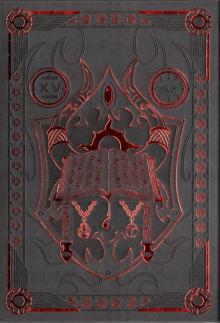 Magnus the Red: Master of Prospero
Magnus the Red: Master of Prospero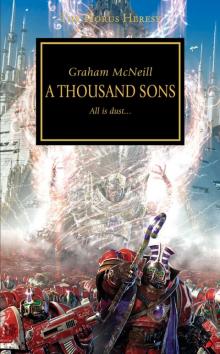 A Thousand Sons
A Thousand Sons![[Warhammer] - Guardians of the Forest Read online](http://i1.bookreadfree.com/i/03/18/[warhammer]_-_guardians_of_the_forest_preview.jpg) [Warhammer] - Guardians of the Forest
[Warhammer] - Guardians of the Forest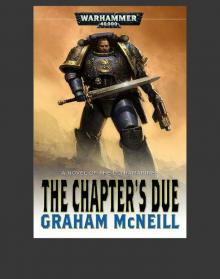 The Chapters Due
The Chapters Due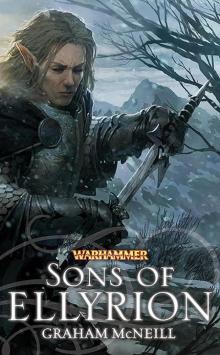 02 - Sons of Ellyrion
02 - Sons of Ellyrion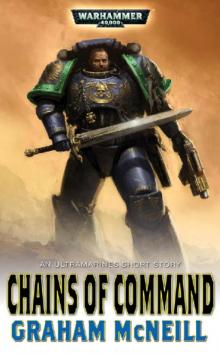 Chains Of Command
Chains Of Command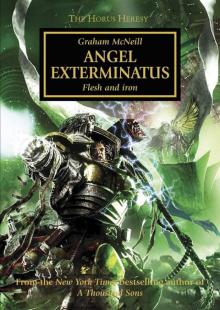 Angel Exterminatus
Angel Exterminatus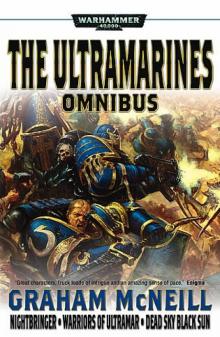 The Ultramarines Omnibus
The Ultramarines Omnibus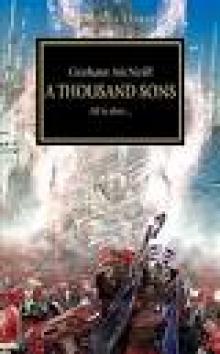 X Marks da Spot
X Marks da Spot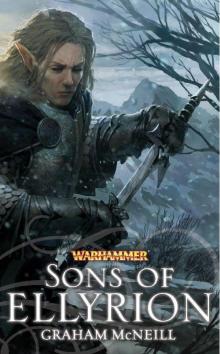 Sons of Ellyrion
Sons of Ellyrion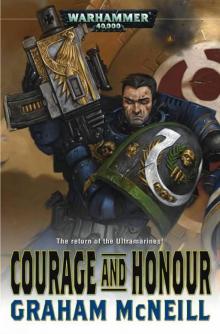 Courage And Honour
Courage And Honour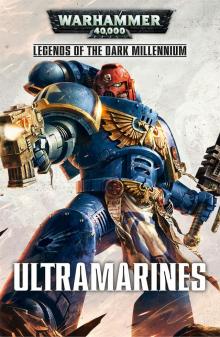 Ultramarines
Ultramarines![[Ulthuan 01] - Defenders of Ulthuan Read online](http://i1.bookreadfree.com/i/03/16/[ulthuan_01]_-_defenders_of_ulthuan_preview.jpg) [Ulthuan 01] - Defenders of Ulthuan
[Ulthuan 01] - Defenders of Ulthuan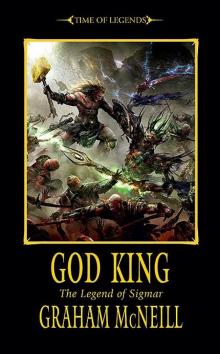 03 - God King
03 - God King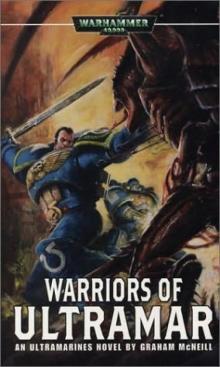 Warhammer - Ultramarines 02 - Warriors Of Ultramar (McNeill, Graham)
Warhammer - Ultramarines 02 - Warriors Of Ultramar (McNeill, Graham)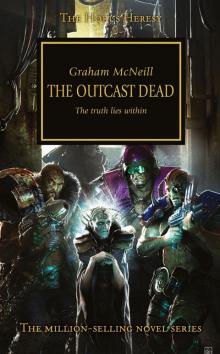 The Outcast Dead
The Outcast Dead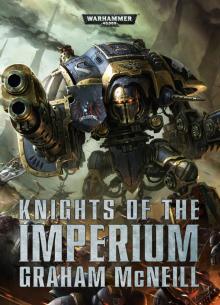 Knights of the Imperium
Knights of the Imperium Defenders of Ulthuan
Defenders of Ulthuan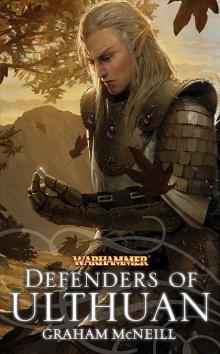 01 - Defenders of Ulthuan
01 - Defenders of Ulthuan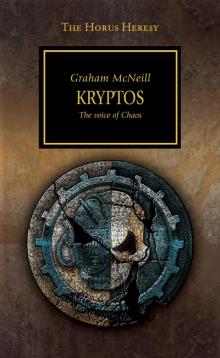 Kryptos
Kryptos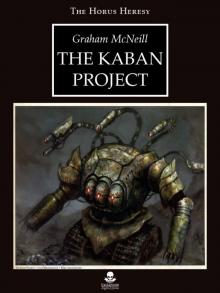 The Kaban Project
The Kaban Project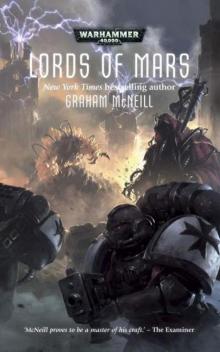 Lords of Mars
Lords of Mars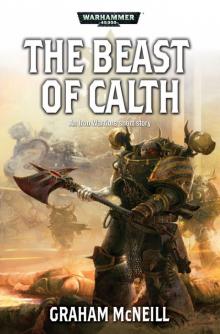 The Beast of Calth
The Beast of Calth Ghouls of the Miskatonic (The Dark Waters Trilogy)
Ghouls of the Miskatonic (The Dark Waters Trilogy)![[Sigmar 01] - Heldenhammer Read online](http://i1.bookreadfree.com/i/03/24/[sigmar_01]_-_heldenhammer_preview.jpg) [Sigmar 01] - Heldenhammer
[Sigmar 01] - Heldenhammer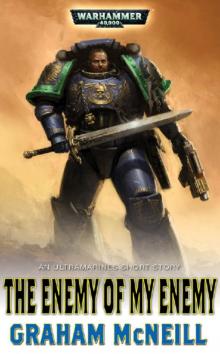 The Enemy Of My Enemy
The Enemy Of My Enemy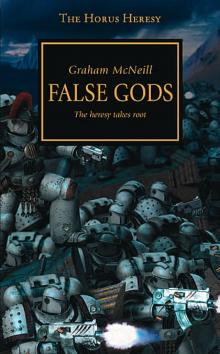 False Gods
False Gods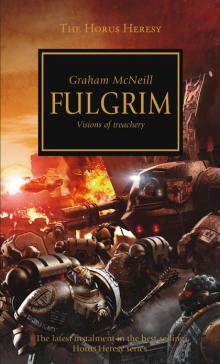 Fulgrim
Fulgrim Mechanicum whh-9
Mechanicum whh-9 Death of a Silversmith
Death of a Silversmith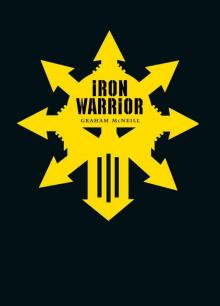 Iron Warrior
Iron Warrior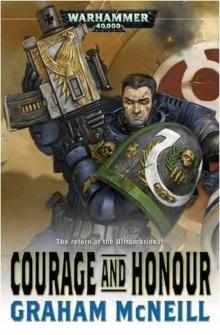 Courage and Honour w4u-5
Courage and Honour w4u-5![[Ultramarines 6] Chapters Due - Graham McNeill Read online](http://i1.bookreadfree.com/i1/03/30/[ultramarines_6]_chapters_due_-_graham_mcneill_preview.jpg) [Ultramarines 6] Chapters Due - Graham McNeill
[Ultramarines 6] Chapters Due - Graham McNeill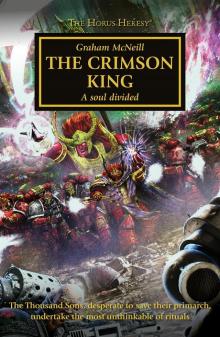 The Crimson King
The Crimson King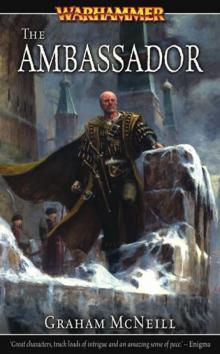 1 the ambassador
1 the ambassador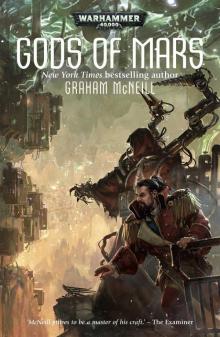 Gods of Mars
Gods of Mars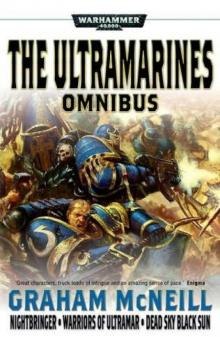 Ultramarines Omnibus (warhammer 40000: ultramarines)
Ultramarines Omnibus (warhammer 40000: ultramarines)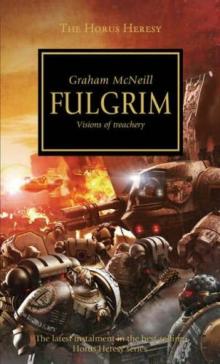 Fulgrim: Visions of Treachery whh-5
Fulgrim: Visions of Treachery whh-5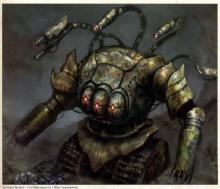 The Kaban Project (warhammer 40000: horus heresy)
The Kaban Project (warhammer 40000: horus heresy)![[Sigmar 02] - Empire Read online](http://i1.bookreadfree.com/i1/04/05/[sigmar_02]_-_empire_preview.jpg) [Sigmar 02] - Empire
[Sigmar 02] - Empire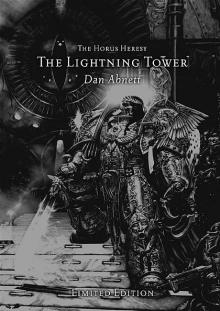 The Lightning Tower & The Dark King
The Lightning Tower & The Dark King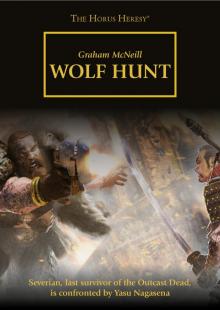 Wolf Hunt
Wolf Hunt Killing Ground w4u-4
Killing Ground w4u-4![Warhammer - [The Ambassador Chronicles 02] - Ursun's Teeth Read online](http://i1.bookreadfree.com/i1/04/05/warhammer_-_[the_ambassador_chronicles_02]_-_ursuns_teeth_preview.jpg) Warhammer - [The Ambassador Chronicles 02] - Ursun's Teeth
Warhammer - [The Ambassador Chronicles 02] - Ursun's Teeth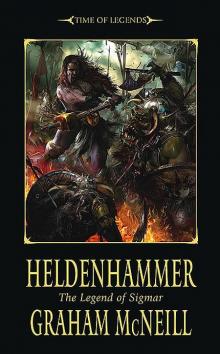 01 - Heldenhammer
01 - Heldenhammer 02 - Empire
02 - Empire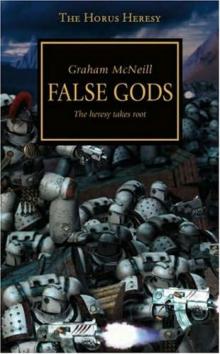 False Gods whh-2
False Gods whh-2